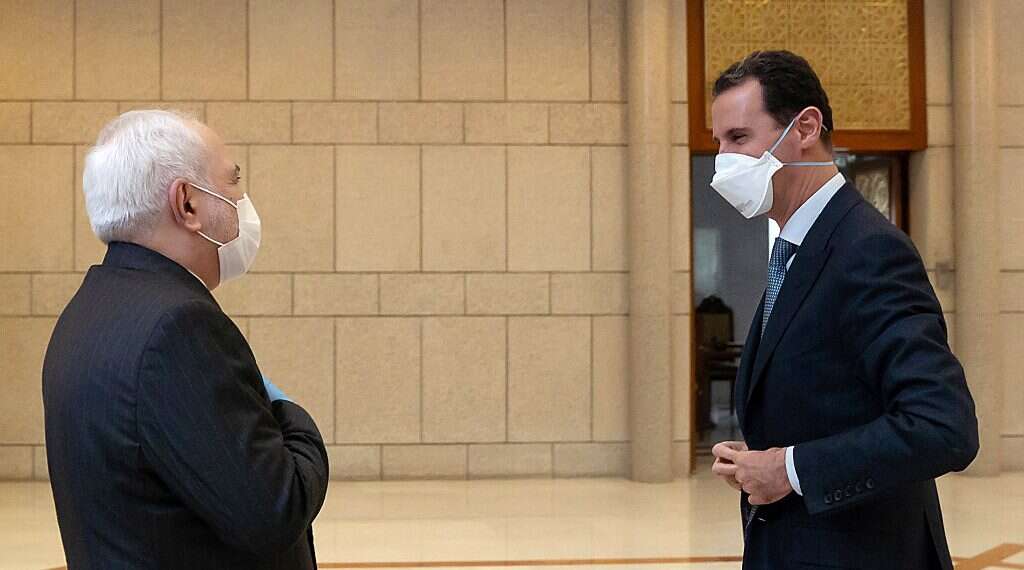by i24NEWS and ILH Staff
Tehran's expenses on the war in Syria are said to be about double its own defense budget in 2019. Former Iranian MP says Tehran expects Damascus to "return the investment."

Iranian Foreign Minister Jawad Zarif and Syrian President Bashar Assad in Damascus, April 20 | Photo: EPA via SANA
The Iranian regime has invested about
$30 billion into bolstering Syrian President Bashar Assad's regime
since the civil war erupted in the country in March 2011, an Iranian
lawmaker revealed in a rare estimate of the cost of Tehran's involvement
in the near decade-long unrest.
The figure comes from Heshmatollah Falahatpisheh, an outgoing member of the Iranian parliament who shared the figures with Iranian daily Etemad in an interview published Wednesday.
According to the Bloomberg news agency, Falahatpisheh, who
was a member of the Iranian government Security and Foreign Policy
Committee, Tehran expects Damascus to "return the investment." He did
not elaborate on how this was to be achieved.
The figure is about twice as high as Iran's own defense budged for 2019, Bloomberg noted. The International Monetary Fund estimates that it comprises approximately 6.5% of Iran's gross domestic product for the previous year.
Iran was one of the first foreign players to get involved in the Syrian crisis, sending militias and Revolutionary Guards troops to assist the besieged Assad regime when anti-government protests turned into a full-fledged civil war. The Islamic republic has also enlisted Hezbollah, its Lebanon-based proxy, to help it in its efforts to shore up the Damascus regime.
Besides support on the ground, Iran also provided Assad with funds, weapons, and oil, and was able to secure a foothold in the Syrian economy in return, getting a major share of the telecom market and receiving a green-light to build a port in the country.
Israel has warned repeatedly about Iran's nuclear ambitions as well as its aspirations of regional hegemony, saying that it will not allow Tehran to entrench itself militarily in Syria, Israel's neighbor to the north.
Most recently, several Israeli defense officials have said that the increase in strikes on Iranian targets in Syria attributed to Israel, the coronavirus pandemic, and the January assassination of formidable Revolutionary Guards Commander Maj. Gen. Qassem Soleimani in a US strike in Iraq, has prompted Iran to start pulling up stakes in Syria.
This article was originally published by i24NEWS
The figure comes from Heshmatollah Falahatpisheh, an outgoing member of the Iranian parliament who shared the figures with Iranian daily Etemad in an interview published Wednesday.
The figure is about twice as high as Iran's own defense budged for 2019, Bloomberg noted. The International Monetary Fund estimates that it comprises approximately 6.5% of Iran's gross domestic product for the previous year.
Iran was one of the first foreign players to get involved in the Syrian crisis, sending militias and Revolutionary Guards troops to assist the besieged Assad regime when anti-government protests turned into a full-fledged civil war. The Islamic republic has also enlisted Hezbollah, its Lebanon-based proxy, to help it in its efforts to shore up the Damascus regime.
Besides support on the ground, Iran also provided Assad with funds, weapons, and oil, and was able to secure a foothold in the Syrian economy in return, getting a major share of the telecom market and receiving a green-light to build a port in the country.
Israel has warned repeatedly about Iran's nuclear ambitions as well as its aspirations of regional hegemony, saying that it will not allow Tehran to entrench itself militarily in Syria, Israel's neighbor to the north.
Most recently, several Israeli defense officials have said that the increase in strikes on Iranian targets in Syria attributed to Israel, the coronavirus pandemic, and the January assassination of formidable Revolutionary Guards Commander Maj. Gen. Qassem Soleimani in a US strike in Iraq, has prompted Iran to start pulling up stakes in Syria.
This article was originally published by i24NEWS
Source: https://www.israelhayom.com/2020/05/26/report-iran-spent-30-billion-on-propping-up-syrias-assad/
Follow Middle East and Terrorism on Twitter
No comments:
Post a Comment